Greg Abbott’s inaction on gun reform after Uvalde is hardly surprising. Until you look at Parkland
As a Republican governor of a historically red state, who is both notoriously cosy with the NRA and in the midst of an election cycle, Abbott’s inaction may come as little surprise. Except that it has been done before, Rachel Sharp writes

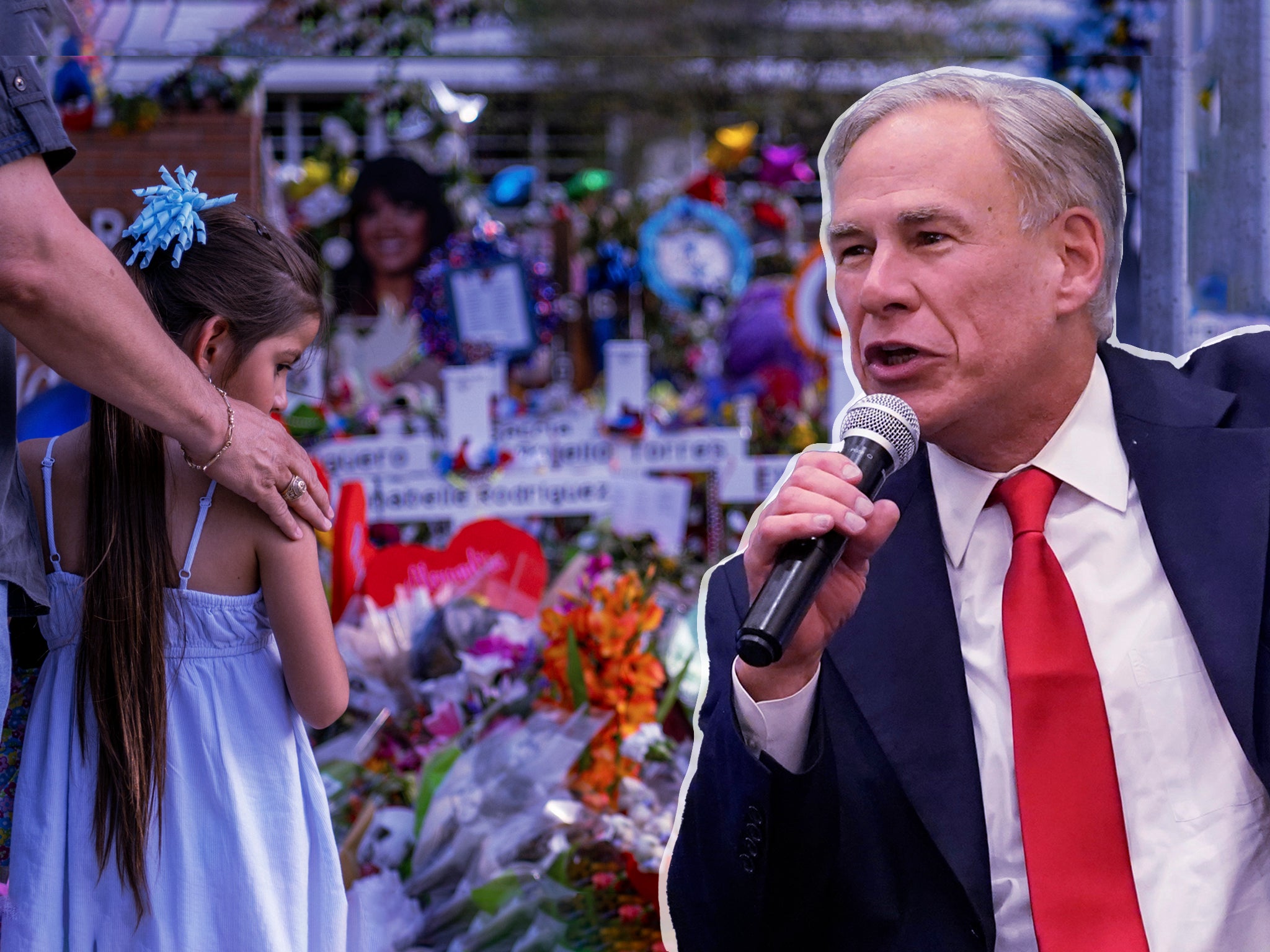
Your support helps us to tell the story
From reproductive rights to climate change to Big Tech, The Independent is on the ground when the story is developing. Whether it's investigating the financials of Elon Musk's pro-Trump PAC or producing our latest documentary, 'The A Word', which shines a light on the American women fighting for reproductive rights, we know how important it is to parse out the facts from the messaging.
At such a critical moment in US history, we need reporters on the ground. Your donation allows us to keep sending journalists to speak to both sides of the story.
The Independent is trusted by Americans across the entire political spectrum. And unlike many other quality news outlets, we choose not to lock Americans out of our reporting and analysis with paywalls. We believe quality journalism should be available to everyone, paid for by those who can afford it.
Your support makes all the difference.It’s a cycle that America can’t seem to get out of.
Innocent victims are murdered in a horrific mass shooting. Calls grow for tighter laws to put an end to families being torn apart by gun violence. GOP lawmakers, often endorsed and funded by the National Rifle Association (NRA) insist that firearms are not the issue. And nothing changes.
This time, the state in question is Texas.
Almost five months have now passed since an 18-year-old armed with a legally purchased AR-15 entered Robb Elementary School in Uvalde and murdered 19 small children and two teachers.
To date, Governor Greg Abbott has refused the requests of grieving families, the Uvalde community and state lawmakers to call a legislative session to even discuss the possibility of changing the state’s weak gun laws.
As a Republican governor of a historically red state, who is both notoriously cosy with the NRA and in the midst of an election cycle, his inaction may come as little surprise.
Except that it has been done before.
Back in 2018, when 17 students and staff were murdered by a 19-year-old gunman in a mass shooting at Marjory Stoneman Douglas High School in Parkland, Florida quickly introduced its first gun safety legislation in over two decades.
The Marjory Stoneman Douglas High School Public Safety Act was signed into law on 9 March 2018 – just 23 days after the Valentine’s Day massacre – raising the minimum age to purchase a firearm from 18 to 21.
The sweeping gun safety bill also imposed a three-day waiting period to purchase a gun and established a red flag law allowing law enforcement to seize firearms from anyone deemed to pose a threat to themselves or others.
The politician signing it into law was Florida’s then-governor Rick Scott — also a Republican. He also boasted the highest possible NRA rating and enjoyed close ties to gun lobbyists. And he was also about to run – successfully – for one of Florida’s seats in the US Senate.
So four years later, when 21 victims were murdered in a school shooting in Texas, why has Mr Abbott not done the same?
“What we’re seeing is that Greg Abbott has no concern for children even knowing that gun violence is the number one cause of death for children in our country,” Debbie Mucarsel-Powell, former US Representative for Florida and senior adviser for gun control advocacy organisation Giffords, tells The Independent.
“There is no concern for that. But what he does have concern for is having an absolute power grab.”
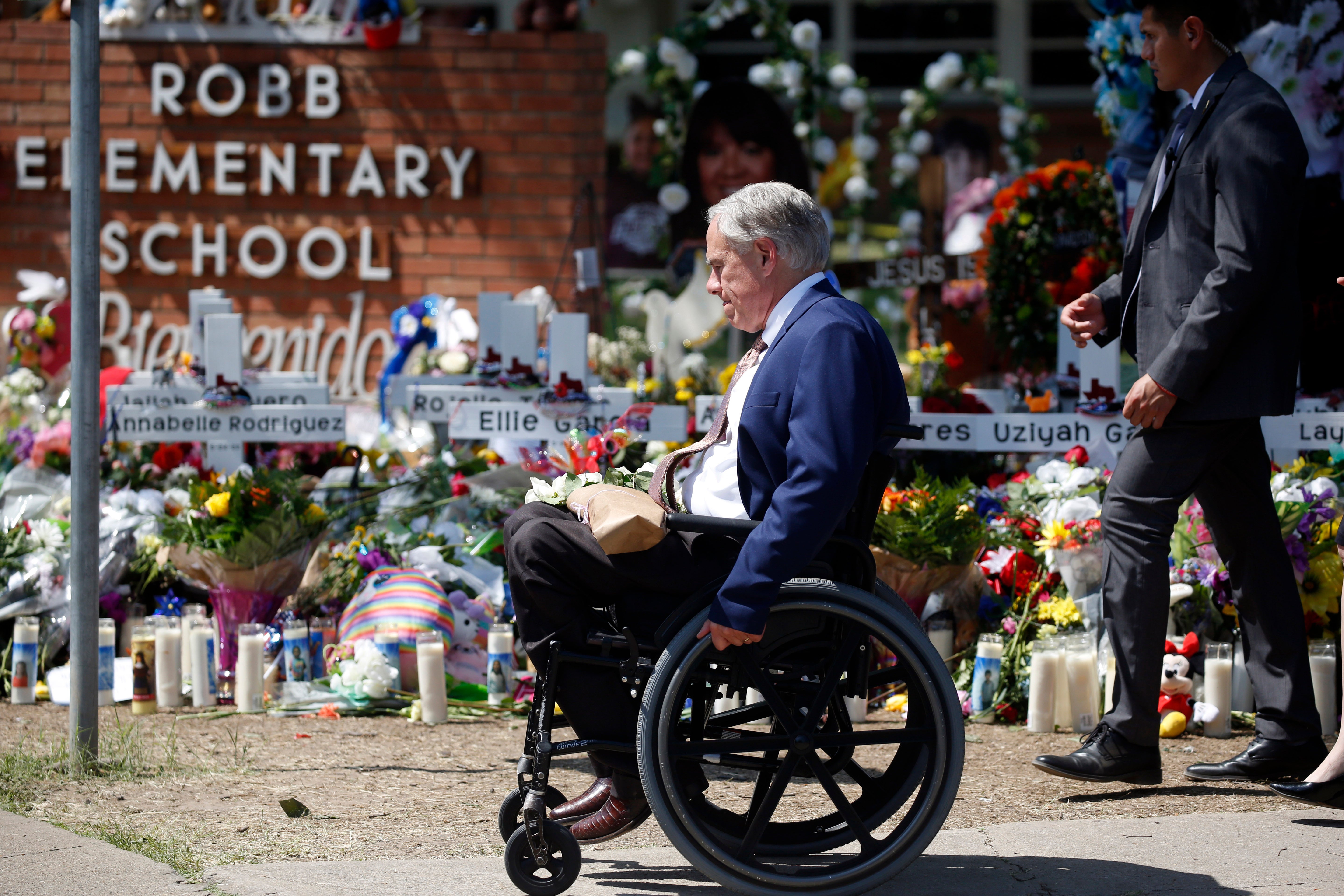
After Uvalde
The Texas governor’s response to one of the worst school shootings in US history fell under scrutiny almost immediately after the 24 May massacre.
When news of the shooting reached him in Abilene, where he was holding a press conference about wildfires, instead of rushing to Uvalde, he continued with his plans to attend a fundraiser to drum up donations for his own reelection campaign.
Initially, Mr Abbott claimed that he only stopped by the campaign fundraiser in Huntsville to “let people know that I could not stay, that I needed to go”.
But this version of events fell apart two months later when campaign finance reports and flight-tracking records, obtained by The Dallas Morning News, revealed that he actually stayed almost three hours at the event.
While devastated parents were receiving the worst possible news, Mr Abbott was raising up to $50,000 in campaign funds.
In the weeks after the shooting, Mr Abbott also came under fire when he was a no-show at the funerals for each of the 21 victims.
When scheduling records exposed his absence, Mr Abbott’s office responded by saying he had sent flowers and condolences to the families and had visited every family who had requested a meeting.
Then there’s been his change in messaging about what happened that day.
One day after the massacre, Mr Abbott gave his first public address in which he heaped praise on the “amazing courage” of law enforcement on the scene. He told the community that had just lost 21 members that “it could have been worse”.
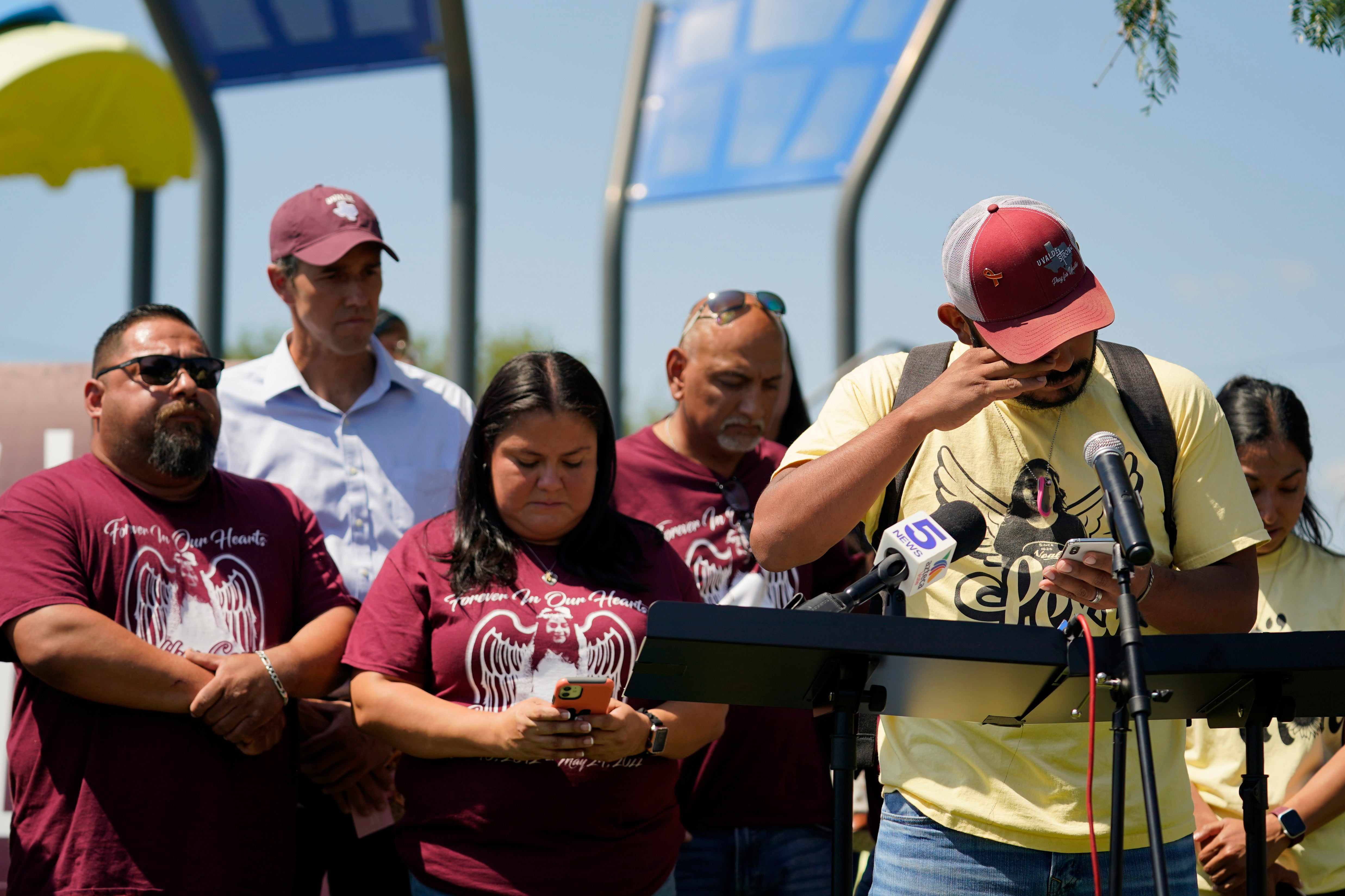
“It could have been worse. The reason it was not worse is because law enforcement officials did what they do,” he said.
This, of course, turned out to be false.
In the days and weeks after the shooting, it emerged that almost 400 officers waited a staggering 77 minutes before breaching the classroom as the gunman continued his murderous rampage and wounded victims bled out.
The police response has now been branded an “abject failure,” one in which officers on the scene prioritised their own safety over saving the lives of the victims.
Mr Abbott later fumed that he had been “misled” by unidentified “public officials” before making his speech.
Three days on from the shooting, the governor spoke out again – this time giving two vastly different speeches with two dramatically conflicting messages on the topic of gun safety.
That Friday, Mr Abbott had been due to speak on stage at the NRA convention in Houston.
In light of the shooting, he pulled out of the event – but not before sending a pre-recorded video message to be played on stage.
In that speech, he undermined the importance of gun safety laws, claiming they have no impact on reducing gun violence.
“There are thousands of laws on the books across the country that limit the owning and using of firearms, laws that have not stopped madmen from carrying out evil acts on innocent people in peaceful communities,” he said.
“In Uvalde, the gunman committed a felony under Texas law before he even pulled the trigger. It’s a felony to possess a firearm on school premises. But that did not stop him.”
The message – a show of defiance that he had no plans to tighten the state’s already weak gun laws – aired at the same time as he was telling the grieving Uvalde community that he “absolutely” expected new laws to be passed in response to the tragedy.
“With regard to a special (legislative) session, let me just say this: all options are on the table,” he said.
“Do we expect laws to come out of this devastating crime? The answer is absolutely yes. And there will be laws in multiple different subject areas. There will be committees formed, there will be meetings held, there will be proposals that will be derived, many of which will lead to laws that will be passed in the state of Texas.”
Five months later and with the midterm elections looming, there’s still no sign of any new gun control laws.
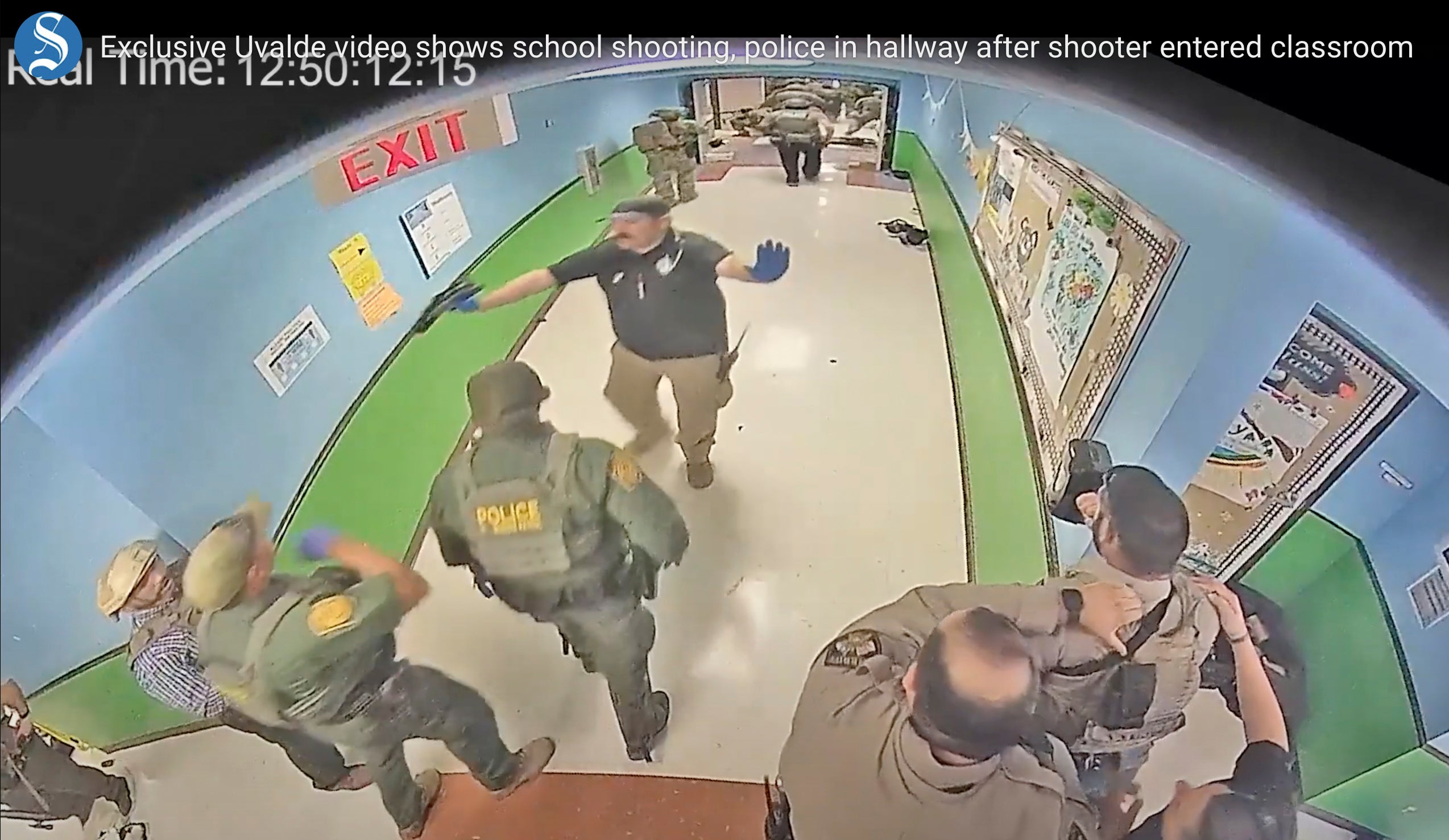
Uvalde officials including the Uvalde City Council, Uvalde County Commissioners and Uvalde CISD School Board have all repeatedly urged the governor to call a special legislative session to at least discuss the possibility of gun reform.
State Representative Tracy King and state Senator Roland Gutierrez – the two Texas lawmakers who represent Uvalde – have also called on the governor to call the session. State Democrats said they would support proposals including raising the minimum age to buy semi-automatic assault rifles from 18 to 21, creating red flag laws, introducing a 72-hour “cooling off” period for gun purchases and regulating private gun sales.
Grieving family members have echoed these demands for change, calling — at the very least — for a raise in minimum age to purchase assault weapons.
Their pleas continue to be ignored.
Last month, Mr Abbott shut down calls to raise the minimum age altogether, claiming it would be “unconstitutional to ban someone between the ages of 18 and 20 from being able to buy an AR”.
Instead of acknowledging that the state’s weak gun laws may have played any part in the massacre (the 18-year-old gunman legally bought two AR-15s just days after his birthday), Mr Abbott has continued to point the finger at mental illness and school safety.
When asked to respond to criticism over the lack of legislative action in the wake of Uvalde, Mr Abbott’s press secretary Renae Eze told The Independent: “Governor Abbott and First Lady Abbott join all Texans in mourning every single innocent life lost that tragic day, and we pray for the families who are suffering from the loss of a loved one.
“Governor Abbott visited Uvalde over several weeks to meet individually with over 30 victims’ families to provide direct assistance, and every month since the tragedy to ensure they are receiving all the resources and support needed to heal.”
His office said that federal courts have ruled that the Second Amendment prohibits raising the age to buy a semiautomatic rifle from 18 to 21.
“Two months ago, a Texas federal court—following the new Supreme Court standard—struck down a law that restricted gun rights for adults 18-21,” the statement continued.
“Governor Abbott continues to work on solutions focused on the root of the problem: mental health.”
Mr Abbott’s office also reeled off a list of other actions taken to “support the Uvalde community and make school safer” including providing 30 law enforcement officers to the school district campuses for the new school year, $105.5m in funding for school safety and mental health services – as well as roping in Chuck Norris to front a program to report suspicious behaviour at schools.
None of those actions involve restricting access to firearms.
Discrimination
All in all, Mr Abbott’s response – or lack of it – has been “criminal” and reeks of “discrimination” towards the low-income, Hispanic community of Uvalde, says Ms Mucarsel-Powell.
“As a Latina who lost my dad to gun violence, what happened in Uvalde hit particularly hard and close to home” she tells The Independent.
“Uvalde is a predominantly Hispanic community and I wonder if his response would have been different if the community was of a higher income bracket and more representative of his base.”
The community make-up (82 per cent Hispanic) is very different to that of the community in Parkland, Florida, where 63 per cent of residents are non-Hispanic white, according to figures from Data USA.
Being situated close to the US’s border with Mexico, Uvalde is also at the peril of the anti-immigrant rhetoric pushed by parts of the GOP under the Trump administration.
“The Parkland community was very white and middle class so they had more support and resources to organise that maybe the Uvalde community has not had,” says Ms Mucarsel-Powell.
“Donald Trump’s radical extreme party has been criminalising immigrants for years now.
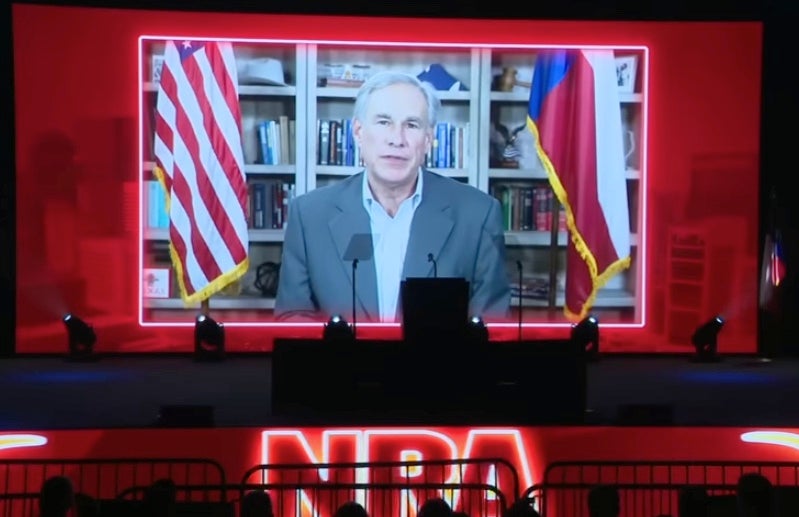
“Is it because of the colour of their skin and their appearance that Republicans have completely dismissed one of the most disgusting tragedies where children were massacred?” she asks.
But, discrimination is only one part of the story.
One of the big differences between Mr Scott’s decision to take action after Parkland and Mr Abbott’s choice of inaction after Uvalde comes from the political landscape they were operating in at the times.
Ms Mucarsel-Powell says the political climate of today is “completely different” to how it was back in 2018.
Political climate
“The political landscape is different. Now, we see a radical extreme Republican party which embraces violence and calls its base to arms,” she says.
The climate is also different in 2022 Texas than it was in 2018 Florida.
While both may be Republican states with Republican governors, back then Florida was actually more “purple”.
“When Rick Scott was responding to Parkland, Florida was closely balanced between Democrats and Republicans for governor and other major offices. It was more of a swing state,” explains Cal Jillson, professor of political science at Southern Methodist University in Dallas.
“Texas on the other hand hasn’t had a Democrat win a state-led race since 1994. Abbott is running again and I think he’s just quite confident and doesn’t feel he has to be particularly responsive to the broader public opinion.”
It’s this confidence that means Mr Abbott isn’t even keeping up the “charade” anymore that he intends to take action, Professor Jillson tells The Independent.
After all, throughout his eight-year tenure, Texas has been rocked by six major mass shootings, according to a Texas Tribune database.
In November 2017, 26 people were murdered and another 20 wounded when a 26-year-old gunman opened fire during Sunday service at the First Baptist Church in Sutherland Springs.
Just six months later in May 2018, a 17-year-old student killed eight classmates and two students at Santa Fe High School.
One year later in August 2019, a domestic terrorist attack at a Walmart in El Paso left 23 shoppers and store workers dead and dozens more injured.
After each of these mass shootings, Mr Abbott has done what Professor Jillson describes as “dance as fast as he can”.
“Abbott has a history of taking a particular approach to a divisive issue and that approach is to dance just as fast as he can,” he says.
“That is to name committees to study the issue, to hold sessions around the state where he appears to be listening to the public and other elected leaders to string things out until the focus moves onto another emergency and do relatively little at the end of the day.
“He knows that, whatever the emergency is, it may appear today to be the focus of attention and people may be demanding a response and expecting change but that two months from now another issue will be front of mind and the emotion around the mass shooting will have faded.
“And he just waits for that to happen.”
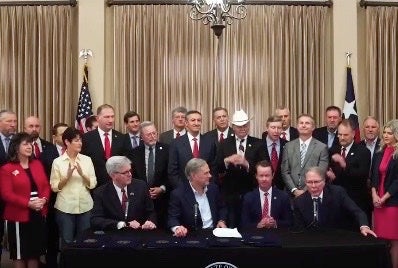
Having gone through the same rigmarole multiple times already, what’s different this time round is that Mr Abbott isn’t even bothering “to go through the charade” but has decided to “just weather the storm,” explains Professor Jillson.
Mr Abbott is seeking reelection in the November midterms but, the professor says that with Democrats not winning a statewide election for more than 25 years, he isn’t too concerned about his challenger Beto O’Rourke.
Just hours before the two men went head-to-head in an election debate on 30 September, 35 family members of Robb Elementary School shooting victims publicly endorsed Mr O’Rourke.
And during the debate, gun control was top of the agenda – with Mr O’Rourke saying that “not a thing has changed” since the massacre.
“All we need is action, and the only person standing in our way is the governor of the state of Texas,” he said.
Mr Abbott meanwhile insisted that gun laws would go against the Second Amendment saying that “we want to end school shootings, but we cannot do that by making false promises”.
Even though Mr O‘Rourke has focused a significant part of his campaign on shining a light on the incumbent’s inaction after Uvalde, Mr Jillson explains that Mr Abbott isn’t too concerned about the threat of Democratic challengers.
Going into the debate, Mr Abbott continued to hold a seven percentage point edge over Mr O’Rourke, according to a recent poll by Quinnipiac University.
“I think he thinks that so long as Texas is a Republican state, all he needs to worry about is the primary election,” says Mr Jillson.
“The general election is not a concern…the margin would need to close significantly before he would change to appeal to the moderate voters.
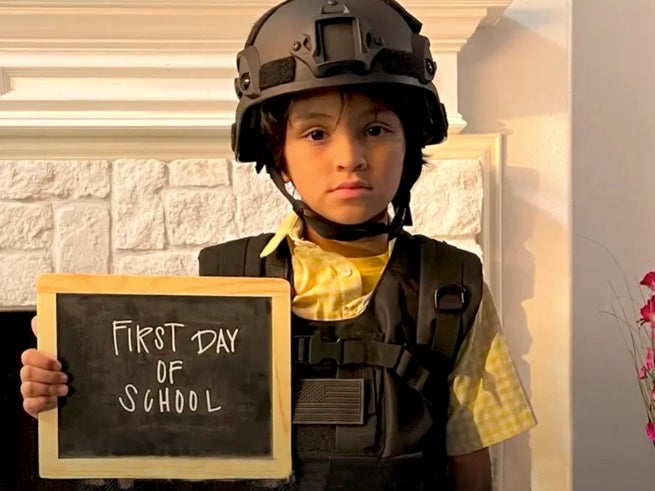
“He’s been through this many times. As Texas governor, he’s had about 10 mass shootings and each time there are calls for dramatic action and he’s dealt with calls in a particular way which is concluding that he’s not going to take significant action so there’s no need to go through the pretence.
“At some time a Democrat will break through but he thinks it’s not likely to be him.”
Instead, he’s more concerned about his fellow Republicans than he is Mr O’Rourke and Democrats.
“His primary concern is what his voters think in the primary electorate,” says Professor Jillson.
“There’s a difference between the position of the primary electorate on gun control – which is no changes ever – and people who vote Republican in the general election which might include moderates and suburban moms who might not be offended at modest gun control legislation.
“But they don’t care about them as they figure the number who will vote for Beto O’Rourke is small. Until Democrats beat Republicans in Texas convincingly a couple of times in top ticket wins, Republicans will keep on only entertaining the primary electorate.”
In this sense, Mr Abbott’s inaction is far less about taking a stand on the issue of gun control and more about staying in power, he says.
After all, Mr Abbott is known for the fact that “his own policy vision is unclear”, he says.
“He’s not a bold political figure. He’s going to pick his way through the rubble and take great care with sensitive issues rather than try to break new ground,” he says.
“That’s why people say he’s much more interested in being governor of Texas than he is in having a firm set of personal beliefs that he wanted to put into public policy.”
Cosy with the NRA
Of course, it’s no secret that the NRA plays a significant part in keeping this crucial Republican primary electorate happy, with the Texas GOP long enjoying a cosy relationship with the gun lobby group.
In the last five years, the NRA has spent more than $2m lobbying Texas state lawmakers – more than double its spending in Florida, which receives the second highest amount of money, data from Open Secrets reveals.
Campaign contributions have been markedly lower with the group’s PAC channeling around $60,000 to pro-gun Republicans in the state.
But among those, Mr Abbott tops the list with $5,000 in campaign funds.
Data compiled by Giffords shows that Mr Abbott has $20,700 in career gun lobby contributions – one of the highest of all candidates in gubernatorial races.
And during his time in office, Texas has continued to loosen its already lax gun laws.
Less than one year before Uvalde, in June 2021, Mr Abbott signed a bill into law allowing Texans without a licence to open carry handguns.
Standing at his shoulder at the bill signing were NRA CEO Wayne LaPierre and NRA president Carolyn Meadows.
Mr LaPierre – who has been accused of using the group as his “personal piggy bank” – even spoke at the signing.
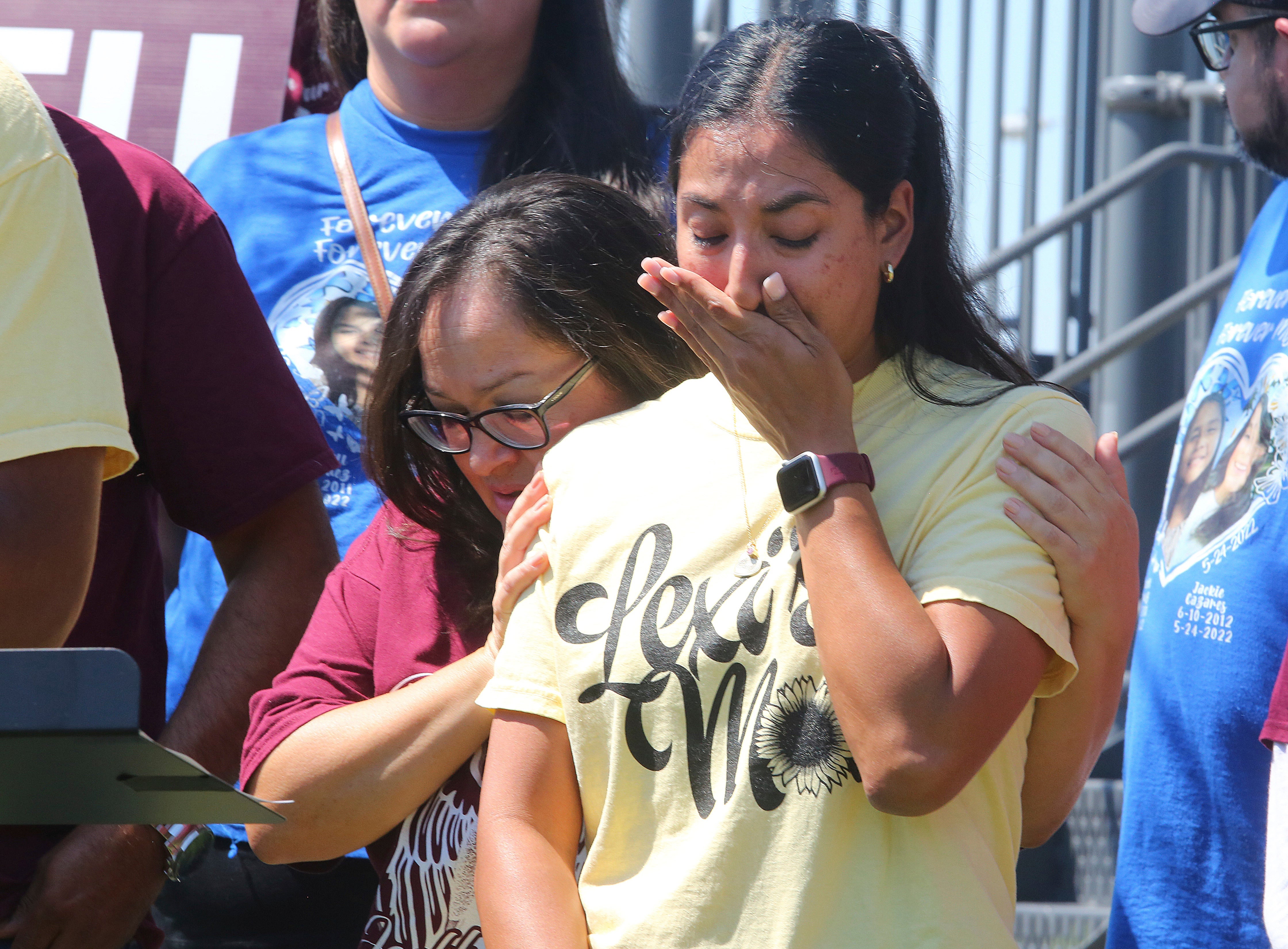
“In this increasingly dangerous world, people want to be able to protect themselves, and thank God Texas is leading the way for the country,” he said.
Mr Abbott has the highest possible rating of A+ from the NRA’s Political Victory Fund (NRA-PVF) and the gun PAC is endorsing him for the governor role.
On the webpage endorsing Mr Abbott, the NRA celebrates the fact that Mr Abbott has signed more than two dozen pro-gun bills into law in his role and has “tenaciously defended the Second Amendment rights of all law-abiding Texans”.
And while campaign donations may appear to be relatively low value in the grand scheme of political campaign chests, experts explain that the NRA’s power now largely comes from its endorsement and ratings – not necessarily from its money.
“The NRA is a shadow of what it once was and it has less money – but it still has clout,” says Professor Jillson.
“Republicans still want that A+ rating.”
In an unusually bold move, Mr Abbott did briefly break rank with the NRA after the Santa Fe mass shooting, by encouraging the Texas legislature to consider introducing a red flag law.
But, when he faced pushback from other Republicans, he quickly backtracked – insisting he was not personally endorsing the idea.
Now, the NRA is perhaps even more wieldy in Texas as it it currently trying to relocate its headquarters from Democratic-led state New York to the state, which is already home to the biggest membership of any state with 400,000 members.
Mr Abbott’s relationship with the NRA today is much like Mr Scott’s was back in 2018.
The Florida governor had received the NRA’s endorsement, an A+ rating and signed several pro-gun bills into law since he took office.
He was described as a “true friend” to gun owners and championed state laws including barring local governments from regulating guns, banning doctors from asking their patients about their gun ownership and expanding the state’s stand your ground law.
And yet, despite the close ties to the NRA, after the Parkland shooting, Mr Scott risked the ire of the powerful gun group when he signed tighter gun regulations into law.
The longtime “friend” of the NRA suddenly found himself being sued by the gun lobby group.
In the federal lawsuit, the NRA said that raising the minimum age from 18 to 21 was unconstitutional. Other gun lobby groups also vowed to derail Mr Scott’s political ambitions in retaliation.
But – even up against the apparent power of the NRA and gun lobby groups – Mr Scott’s career appears to have been unharmed.
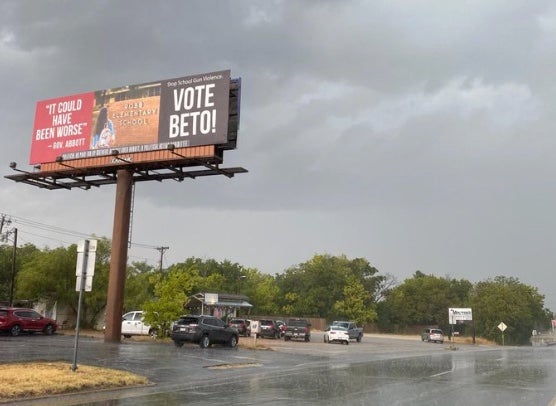
He won the Senate seat later that year and is currently said to be mulling a 2024 White House run – once again raising questions about why Mr Abbott won’t even consider any common-sense gun laws.
Yet, that’s not to say that Mr Scott should be put on pedestal for taking something of a stand against the NRA, says Ms Mucarsel-Powell.
Like Mr Abbott today, it was all part of an attempt to seek reelection, she says.
Coming less than two years after the massacre at Pulse nightclub, the Parkland community had organised quickly and effectively following the 14 February 2018 attack.
In March 2018, students who survived the shooting led an estimated 800,000 Americans through Washington DC for the huge gun control protest March for Our Lives. Hundreds of smaller events also took place across all corners of the nation.
“In 2018, Rick Scott wanted to run for the Senate. It was a few months before the November election and he saw how quickly the movement after Parkland was growing,” says Ms Mucarsel-Powell.
“Young voices came out and they were extremely powerful. I wouldn’t give the credit to Rick Scott but to the parents and students who took their trauma and put it into action and demanded change.
“He did the bare minimum to be able to get votes when he ran for Senate – and then he quickly turned his back on Florida.”
Performing a backflip
One look at Mr Scott’s record on gun control in today’s climate appears to confirm this.
In June – weeks after the mass shooting at Robb Elementary School – Mr Scott performed a backflip on his stance.
He voted against the Bipartisan Safer Communities Act – a sweeping gun reform bill created by a group of both Democrats and Republicans in response to Uvalde.
In an interview with CNN, the senator also said he would be opposed to a federal bill raising the minimum age to buy assault weapons to 21– despite the fact that he signed a bill into law doing just that in the state of Florida only four years earlier.
Not only did Mr Scott support the state bill back in 2018, but he slammed the federal government for not taking action with a law of its own at the time.
“If you look at the federal government, nothing seems to have happened there,” he said in 2018. “You go elect people, you expect them to represent you, get things done.”
The following year, he then wrote in an op-ed for The Washington Post that while he supports the Second Amendment he also supports red flag laws.
Fast forward to today and he appears to have had quite a change of heart.
“My focus is 100% on school safety & protecting our teachers & students,” he tweeted in June.
“Taking rights away from law-abiding Americans is not the answer & nothing more than an attack on the 2nd Amendment.”
Mr Scott is just a “shameful hypocrite,” says Ms Mucarsel-Powell. “It’s crazy that now he’s in the Senate, he’s playing to a completely different tune.”
For both him and Mr Abbott it’s “all about power,” she says.
“They don’t stand for anything else other than their individual grab onto power.
“Look around nationally and what you see is Republicans in elected offices competing to see who’s going to be the most radical, extreme politicians. This extreme Republican party now has no space for anyone who wants to work on gun safety measures… no breathing room for anyone.
“Everyone has to stand in line and that line is political violence and gun profits over the safety of people in this country. They’re trying to be the face of gun violence for the party.”
Motherhood in America
For Nancy Thompson, the GOP’s refusal to address gun violence is a big part of why she’s turned her back on the party.
The self-confessed former “diehard Republican” now runs a political movement called Mothers Against Greg Abbott or MAGA – an ironic riff on Mr Trump’s slogan – calling for Mr Abbott’s removal and supporting Mr O’Rourke for governor.
Recently, the group launched a poignant “back to school” advert, showing a small child getting ready for their first day back in class.
The boy is dressed head to toe in body armour, with the ad reading: “Our children are not soldiers.”
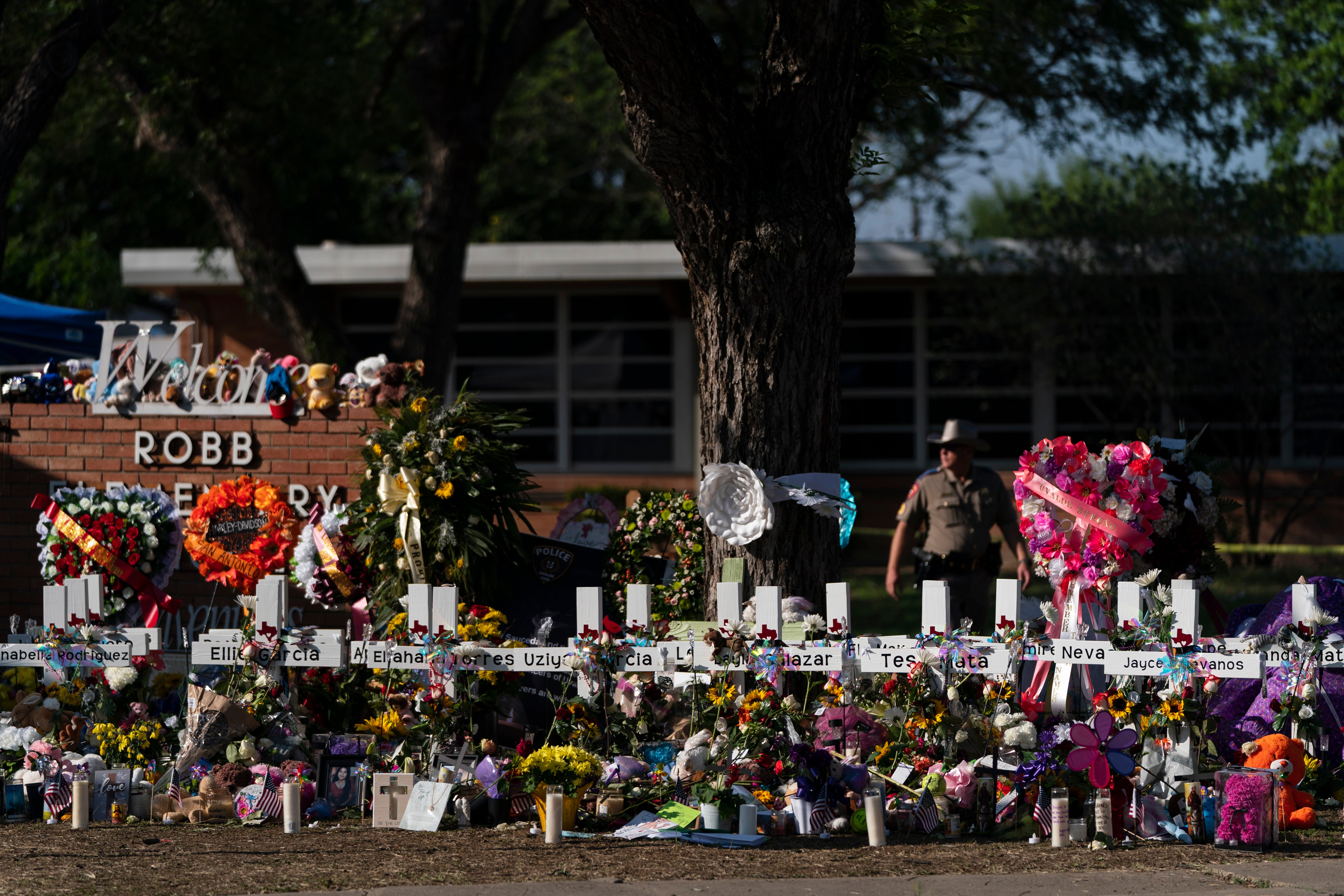
The group has also erected billboards in Uvalde with Mr Abbott’s now infamous phrase “it could have been worse”.
As a mother-of-three from Austin, Ms Thompson tells The Independent that Mr Abbott has “failed Texan families” in his response to Uvalde and left parents living in fear of sending their children to school.
“I think over and over again his actions have shown us that he has failed Texans,” she says.
“Texas leadership as it stands is not very conducive to families. It does not support Texas families.”
She adds: “I’m worried, terrified, angry and there isn’t a day I don’t think when I say goodbye to my children that it could be that day.
“That is in essence motherhood in America. Millions of mothers across America drop their kids off at school in the morning and hope today is not the day. And it’s all because the government forgot to take care of our families and now we have consequences.”
Ms Thompson says it’s “maddening” that Mr Abbott is not listening to the families of gun violence victims or survivors.
“When you have the NRA donating a lot of money to campaigns, those are the people they answer to – not everyday citizens, not everyday Texans,” she says.
“And that’s who lost that day. We lost 19 children and two teachers that day and we lost a lot of our innocence.”
Looking at the Uvalde community grieving 21 victims of gun violence, Ms Thompson says that Texans need to now take the issue to the ballot box.
“Right now everything is on the table for Texas families,” she says.
“We have to protect our families and that comes before politics.”
Ms Mucarsel-Powell agrees: “Greg Abbott thinks he can dismiss the pain of the Uvalde community. That’s why every one of us needs to exercise our duty and make sure we elect candidates to put our interests and the lives of children before anything else.”
Ultimately, she says Americans need to ask themselves an important question: “Is this the country that we want to live in?”



Join our commenting forum
Join thought-provoking conversations, follow other Independent readers and see their replies
Comments